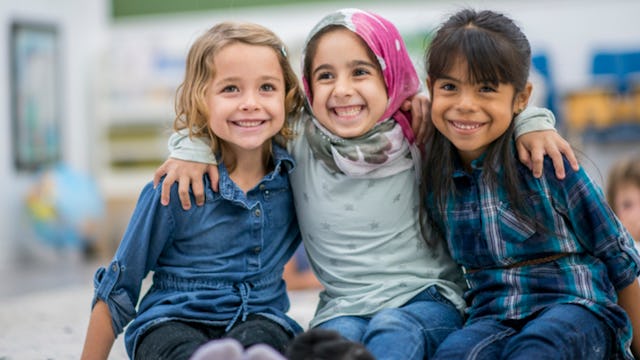Your Kindergartener’s Social Skills Matter More Than Their Academics

I remember the first time I stood in a herd of parents shortly after my daughter started kindergarten—it was the annual field trip to the pumpkin patch. The kids listened to their teach give directions while a mob of parents stood off to the side watching. The kids were so excited, and nearly every child had a parent present.
There was a bit of small talk amongst the parents, most of it superficial and introductory since many of us were meeting for the first time. There were some parents who knew each other from preschool, daycare, or summer activities, but I didn’t know anyone, so I just smiled politely and engaged when I could.
Flash forward a few months, after a few parent-teacher conferences, and things were a bit different, at least from my perspective. I knew a few mothers by this point, and easily made casual small talk. What your kid was doing, both in school and outside of school, seemed to be hot topics, with extra emphasis on the areas a child was excelling. Humble-bragging and passive competitiveness found their way into nearly every conversation. I suppose to some extent I knew this would be a thing, I just didn’t realize it would start in kindergarten.
Well, as it turns out, a study conducted in 2015 concludes that it doesn’t really matter if your kid is a star athlete or an academic wizard in kindergarten. In fact, the greatest measure of a child’s success at age 25 is their social abilities. That’s right, Becky, so we’re all glad your son has been writing his full name since he was a fetus, but research says, that doesn’t matter all that much—whomp, whomp.
With all the standardized testing, it’s easy to see why so many parents get wrapped up in test scores and comprehension levels, but our children’s socio-emotional development is where we should really be focusing our attention. Of course, it’s important to keep in mind the neurodiversity of children –including kids with ADHD, kids on the autism spectrum and highly sensitive children — and understand that social skills vary and and happen at different paces.
So, how can we help our kids? Well, for starters:
1. Play
Play time is great, but providing unstructured play time that allows your child to engage with other kids on their own terms, use their imagination, and problem solve. All of which can be greatly beneficial to their developing mind. Unstructured play encourages social skills that will serve them well for years to come.
2. Emotional Intelligence
Emotional intelligence is just a fancy way to say you understand emotions, not just your own, but the emotions of others as well. Teaching your child to identify their own feelings and the feelings of their peers will help them get along with others. Label your feelings and emotions as often as you can, and encourage them to do the same. When your child tells you they’re mad, help them explore that feeling by asking, “Why are you mad?” Validating their emotions and helping them resolve issue of anger or sadness, for example, will help build problem solving skills and teach empathy for others. Coloring pictures or reading books together are other great ways to explore emotions.
3. Role-Modeling
This should go without saying, but be who you want them to be. Show your child what healthy social skills look like—be kind, offer support or help to others, and give praise for a job well-done. It’s great to let your child see you helping other, but also be sure to give them opportunities to help those around them. This will help them recognize the needs of other, and by helping others meet those needs they are expanding on those very valuable social skills.
4. Let Them Work It Out
This one can be challenging, because as parents, sometimes we want to swoop in and fix the problem, but problem solving is an important piece of the social skills pie. Though it may be hard, let your child struggle. Let them consider the problem and possible solutions. For young kids, this can be as simple as letting them work out a sharing dispute with a sibling or friend. Be present in case conflict resolution isn’t possible without your assistance, but give your child the opportunity to figure it out on their own and build those skills.
So, there you have it, it doesn’t matter if a child is in the advanced reading group or if they excel at competitive sports. What matters most is how they interact with those around them, and lucky for us parents, we’re a big part of showing them how it’s done.
This article was originally published on